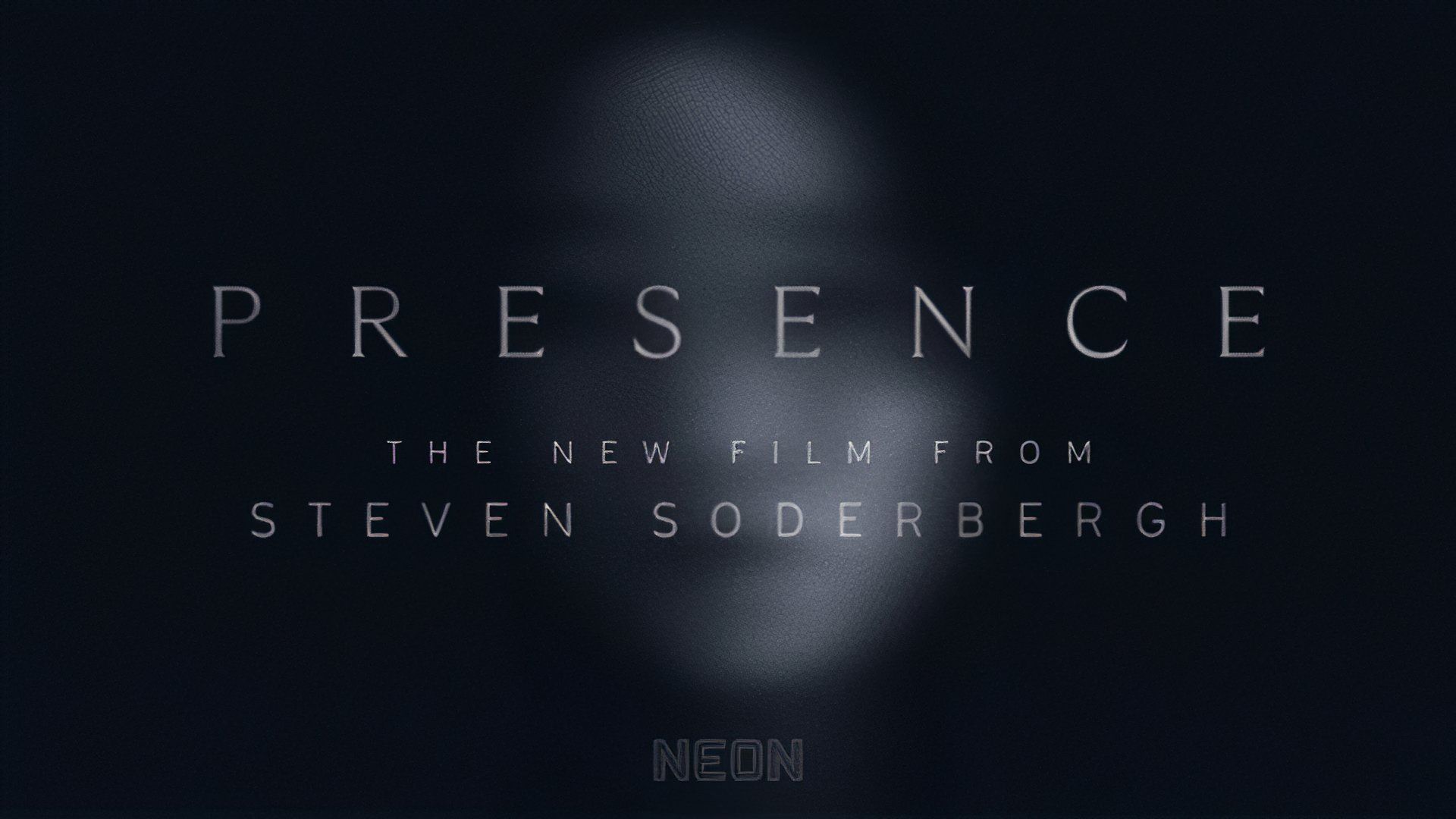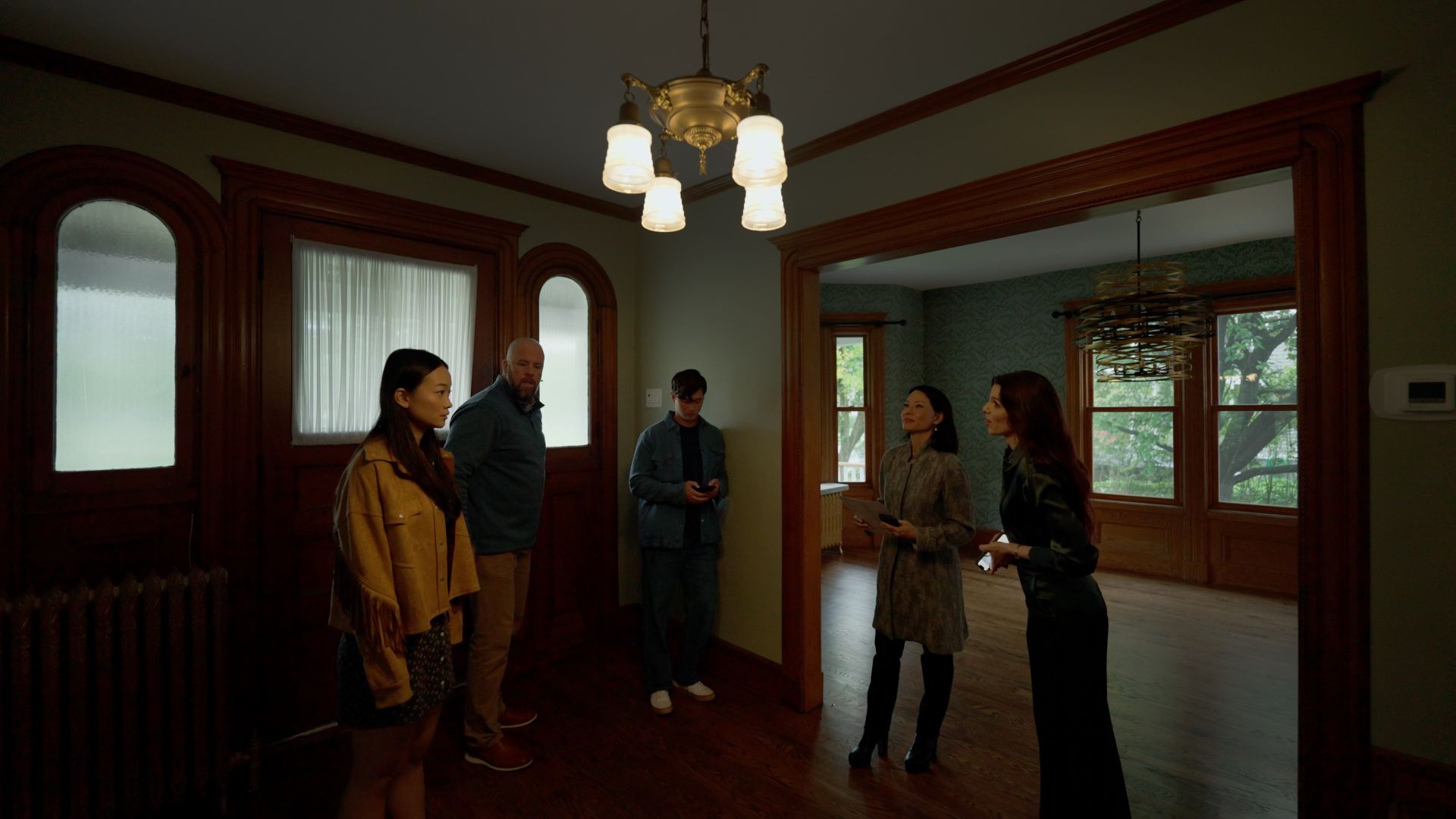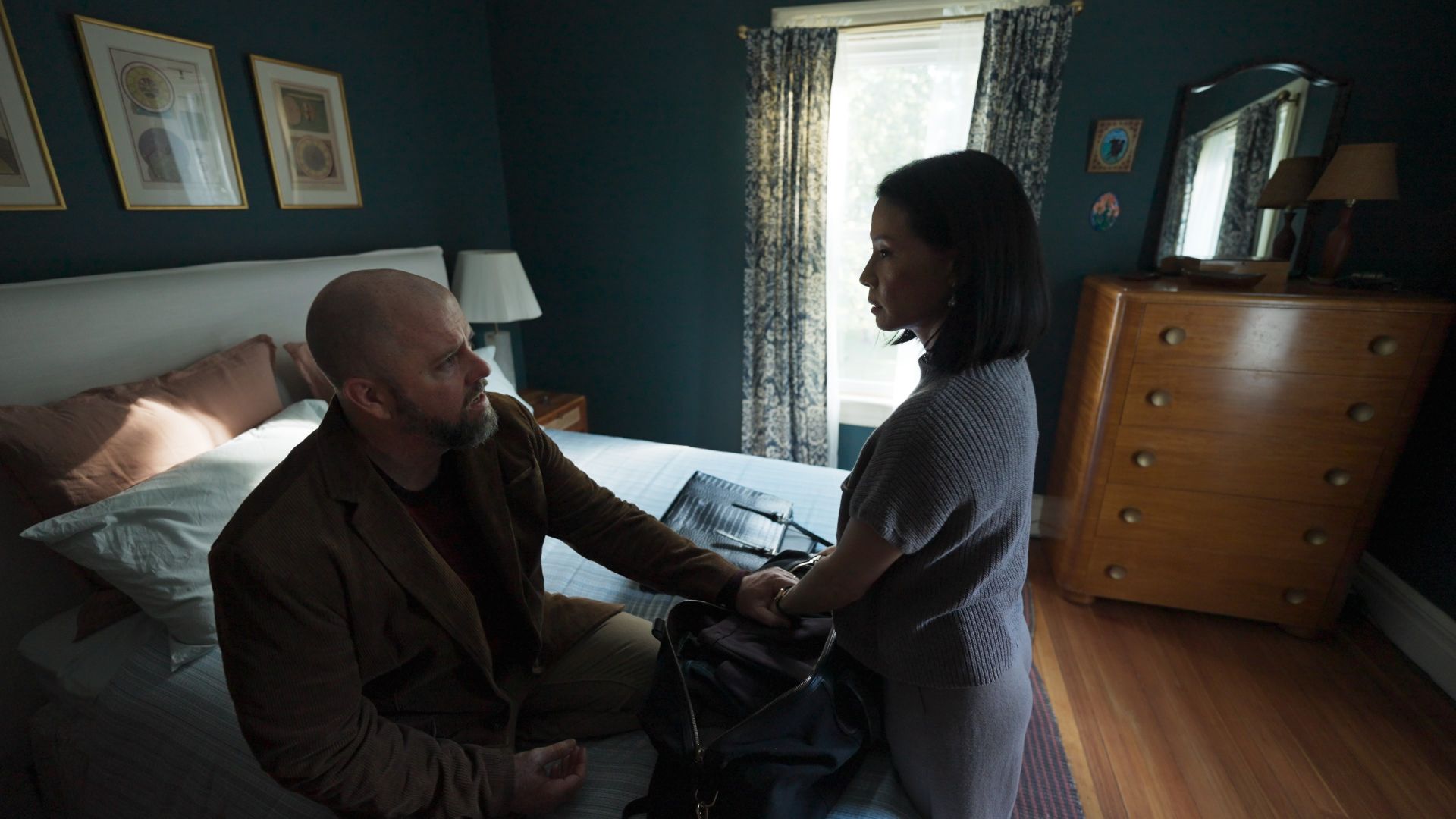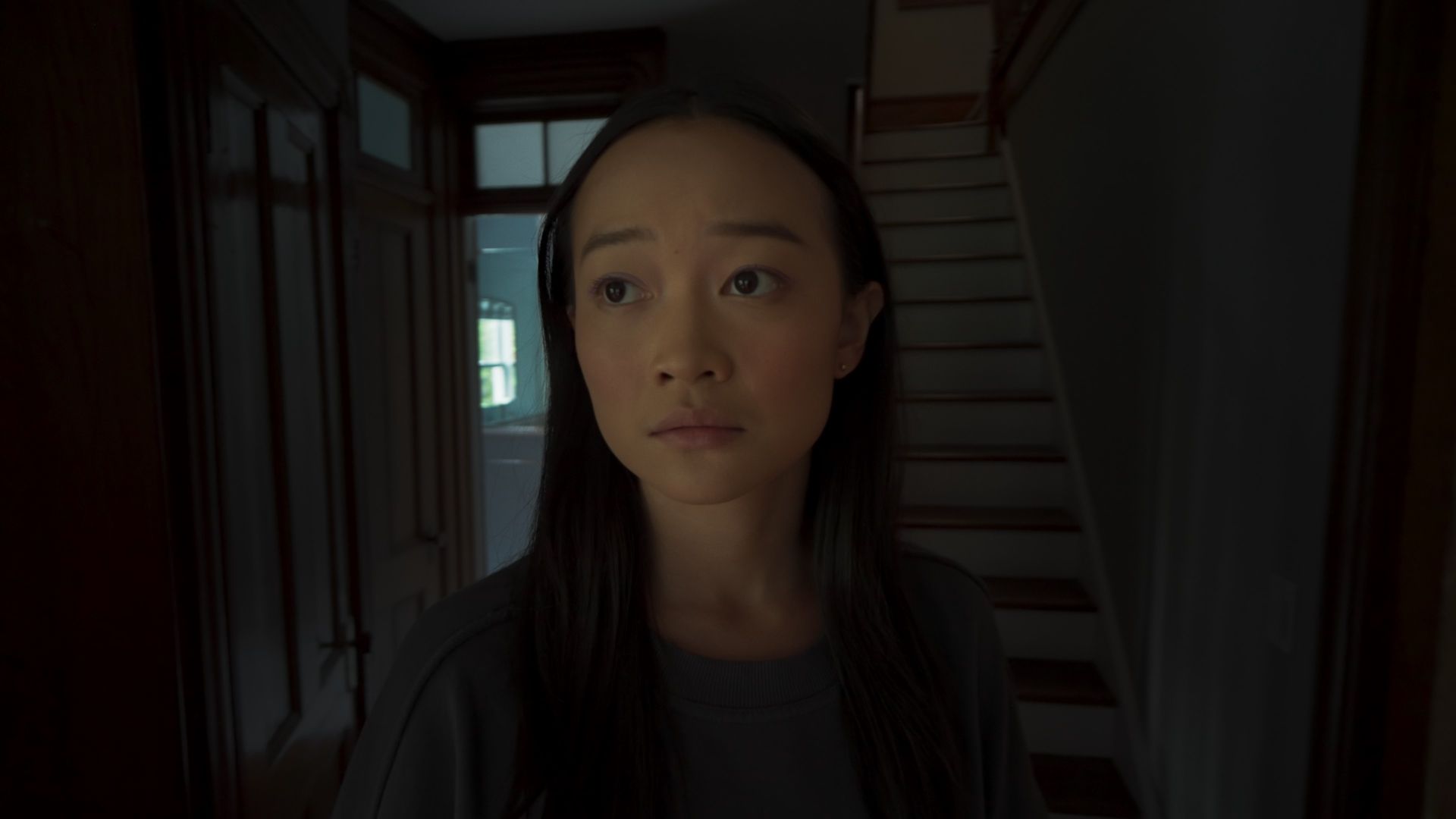
In a nod to traditional, tense thrillers yet incorporating contemporary themes, Steven Soderbergh’s film Presence showcases innovative camera work. Soderbergh’s knack for experimenting with camera placement and integrating these experiments into compelling narratives is evident once more. The movie itself is tautly constructed, much like a modern take on an Alfred Hitchcock thriller, where the suspense is built subtly without excessive exposition.
We Are the Audience Haunting Their House
The narrative unfolds within a single house, captured primarily through one camera’s perspective, focusing on a family and a handful of peripheral figures. Lucy Liu portrays Rebecca, a high-strung family matron with two teenage offspring, Chloe (played exceptionally well by Callina Liang from Bad Genius) and Tyler (Eddy Maday). Chris Sullivan plays the role of Rebecca’s husband, Chris, who is deeply troubled about maintaining the family’s unity following the enigmatic demise of Chloe’s friend, a tragedy that weighs heavily on his daughter. While Chloe grapples with her hardships, Tyler seems indifferent, even embracing harmful masculine ideals as exemplified by his friend, Ryan (West Mulholland). Rebecca, overwhelmed and symbolic of the modern-day strain of parenthood, is often seen engrossed in her phone or computer, not necessarily out of choice.
In this dysfunctional household, tensions run high enough for a soap opera, yet it’s the presence of the camera that sparks the narrative. The film is shot in an observational style, yet this observer subtly intervenes in the events. Chloe, struggling with her solitude and melancholy, occasionally senses these interventions.
Initially, Chloe becomes anxious about the mysterious ‘presence’ she encounters, but it’s only her father who appears to share her concerns. Over time, the family is compelled to acknowledge that something is gravely amiss as the presence makes attempts to communicate with them. This situation propels them into numerous attempts to resolve their supernatural dilemma. The story reaches a climax when Rebecca and Chris decide to leave their teenage kids (including Ryan) at home while they go on a weekend trip, resulting in a dramatic denouement.
The Title Is the Key: Decoding ‘Presence’

The uniqueness of “Presence” lies in its title itself, which hints at the possible themes and the underlying terror portrayed. Although the narrative delves deeper into Chris and Chloe, it essentially revolves around Rebecca and Tyler. The dual meaning of “Presence” becomes apparent when we ponder on the contemporary parent’s struggle with time slipping away, as their children are more engrossed in the digital world than real-life interactions.
As a movie critic, I find myself pondering over how modern technology is reshaping family dynamics in our society, particularly the issue of constant screen time for both parents and children. The movie under review seems to pose a thought-provoking question: Can we truly nurture familial bonds when our eyes are glued to digital devices? It’s a conundrum that leaves one questioning the essence of presence in today’s world. Are we, as family members, merely present when engrossed in the virtual realm, much like an audience captivated by a movie screen? Is there any tangible interaction left when our focus is on the digital devices?
A Masterclass in Old-School Suspense
Soderbergh skillfully employs some of the most powerful techniques in cinematic craft, particularly utilizing the perspective of a handheld camera to subtly unveil the narrative. This technique enables the story to be told through casual comments overheard, small gestures made when characters think they’re unobserved, and brief asides. As a result, the audience often knows more than the characters within the story, creating a sense of dramatic irony – a concept famously discussed by Hitchcock in his insightful interview with François Truffaut. Essentially, Soderbergh demonstrates that filmmakers have crucial decisions to make about what information they reveal to their viewers.
If a bomb lies hidden beneath a table during a conversation between two characters, and it explodes unexpectedly, it creates a shock or surprise. Conversely, if the viewers are aware of the bomb’s presence under the table but the characters remain oblivious, that tension builds to what we call “suspense,” and Hitchcock was undeniably skilled at crafting such suspense. In this new work, Soderbergh is venturing into the realm where Hitchcock excelled – planting hidden perils (bombs under tables) across the movie. The camera serves as his tool for exposing these dangers to us viewers, making it a silent but ever-present witness or threat.
This method propels the narrative, keeping viewers engaged by revealing fragments of information along the way, leaving them eager for more and curious about when the explosions will occur. The movie underscores the idea that a captivating tale can be crafted with minimal characters, settings, special effects, or runtime. Soderbergh’s work encourages filmmakers at all levels to recognize that impactful storytelling is easily achievable.
The Mostly Good Performances in ‘Presence’




In certain aspects, the role that demands the greatest skill in the movie is not that of any actor, but the camera itself. It exhibits traits, it follows a narrative journey, and it actively participates in the unfolding drama. Instead of merely observing as an all-knowing entity, like most films, the camera becomes a character within the story. This requires the human actors to deliver something fresh and innovative, which can occasionally succeed but sometimes falls short.
In this tale, Chloe, portrayed by Callina Liang, sets off on a journey, leaving behind labels that suggest trouble and gaslighting in her past. Liang masterfully tackles various obstacles as she delves into the character of a young girl grappling with loss, contemplating mortality, navigating the transition to womanhood, and dealing with a tense relationship with both her mother and brother. It’s quite a burden she carries, but Liang handles it all flawlessly, never faltering in her performance.
In a different phrasing, Eddy Maday portrays Tyler as a character who appears straight-forward, yet exhibits tendencies of being overly dramatic at times. His dislike for his sister is pronounced to the extreme, and his attempts to seem tough and mature occasionally feel forced. It seems that this is the essence of the character as it’s been written, and Maday doesn’t introduce much additional nuance to it. On the other hand, West Mulholland encounters some very intense and significant scenes as Ryan, and these moments might not resonate positively with everyone.
Liu frequently immerses herself in her tasks and technology under the persona of Rebecca. Despite being a significant cast member, she appears to be the least developed character on-screen. Her tendency to avoid eye contact or engage less often serves as a defining trait for her character. Interestingly, this narrative seems to revolve around her. In the finale, the lesson about ‘presence’ that she ultimately learns resonates deeply with us, the audience.
Chris Sullivan delivers an outstanding portrayal of the burdened father figure. A touching moment he has with Chloe midway through the movie showcases a model parent-child relationship that transcends the hurdles the narrative presents. He spends much of the tale grappling to bond with his family, making efforts to uphold their best interests while also ensuring his own moral compass. In the end, he leaves Tyler with a poignant line, “deep down, you’re a good man,” which can be seen as another skillfully placed foreshadowing device or an example of ‘Chekhov’s gun.’
In the heart of its storyline, the shortcomings of the narrative titled “Presence” become apparent. As the characters realize they’re dealing with something supernatural, they largely opt to carry on as normal. This leads to peculiar acting moments and scenes that require an audience suspension of disbelief, which might be slightly beyond their grasp.
‘Presence’ Is Packed with Meaning (For a Willing Audience)
As a movie enthusiast, I find films with a minimalist approach, like the captivating “Presence,” to be intriguing. Similar to Hitchcock’s timeless masterpieces, which have been explored and reinterpreted in countless ways, “Presence” invites viewers to delve into its depths, offering a multitude of potential meanings.
A suitable film for mature viewers should effectively tackle complex issues without requiring excessive financial resources or prolonged viewer time. The movie Presence delves into various aspects such as child-rearing, sexuality and maturation, the contemporary family setup, societal roles based on gender, and the essence of cinema appreciation. Each theme offers ample scope for in-depth exploration.
Is it intentional that these messages and meanings are woven into the narrative by Soderbergh, a renowned filmmaker who consistently leaves interpretation open-ended? Instead of planting hidden messages, Soderbergh crafts compelling narratives using innovative techniques, leaving it to the audience to decide their level of involvement – whether passive or active. The film “Presence” will grace theaters on January 24, 2025, distributed by NEON.
Read More
- Grimguard Tactics tier list – Ranking the main classes
- Gold Rate Forecast
- 10 Most Anticipated Anime of 2025
- USD CNY PREDICTION
- Box Office: ‘Jurassic World Rebirth’ Stomping to $127M U.S. Bow, North of $250M Million Globally
- Silver Rate Forecast
- “Golden” Moment: How ‘KPop Demon Hunters’ Created the Year’s Catchiest Soundtrack
- Castle Duels tier list – Best Legendary and Epic cards
- Black Myth: Wukong minimum & recommended system requirements for PC
- Mech Vs Aliens codes – Currently active promos (June 2025)
2025-01-21 02:36